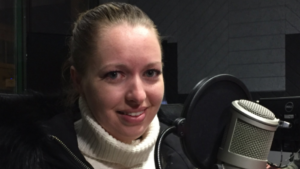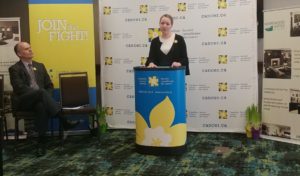Researcher Alyssa Vito was only 23 years old when she was diagnosed with breast cancer

When Alyssa Vito found a lump in her breast at the age of 23, she was told she was too young to have cancer.
But despite having no family history of the disease, Vito was eventually diagnosed with breast cancer.
“You can’t really do anything except be in shock, to be honest, when it happens,” Vito said in an interview with CBC’s Morning North.
“I had just finished my undergrad where I was on a rowing scholarship. I was very athletic, very healthy, very active. I definitely did not expect to have a cancer diagnosis.”
Vito, who lives in Hamilton, was in Sudbury on Friday for the launch of the Canadian Cancer Society’s Daffodil Month. The goal of the annual campaign is to support research and people living with cancer.
From survivor to researcher
For eight and a half months after her diagnosis, Vito underwent a partial mastectomy, eight rounds of chemotherapy and 33 radiation treatments.
At age 30 she is now cancer free, but the disease had a tremendous impact on her path in life.
Vito had originally planned to go to medical school to become an oncologist. After her diagnosis, she said she couldn’t fathom the amount of time that would take.
Instead, she enrolled in graduate school at McMaster University to pursue a master’s degree in chemical biology. She is now working on her PhD, with a focus on immunotherapy treatments for breast cancer.
“I really never thought I would go to graduate school. It definitely was not on my radar and not something that I had wanted to do,” Vito said. “So I don’t think I would’ve ended up doing a PhD in cancer research had I not had that experience.”

Although Vito had been a long-time volunteer with the American and Canadian Cancer Societies, her work in cancer research has helped her better understand the need for funding and support.
“The general person who doesn’t do research doesn’t really have any way of knowing just how expensive, but it really is very expensive to do the small experiments that we have to do everyday in the lab and that requires a lot of funding,” she explained.
Vito said the Canadian Cancer Society will be holding regional and local events throughout April for Daffodil Month. Volunteers will also sell daffodil pins to raise money.


